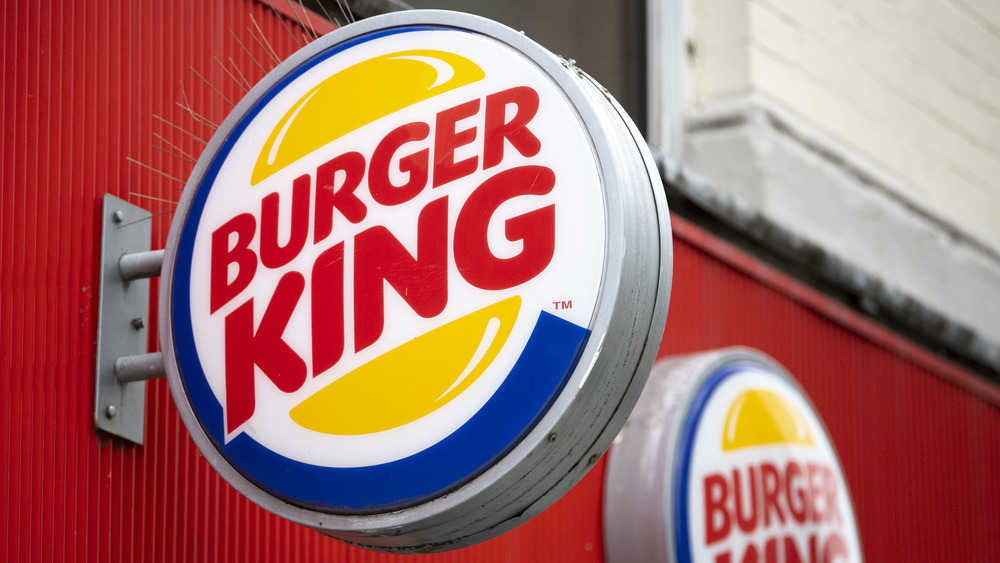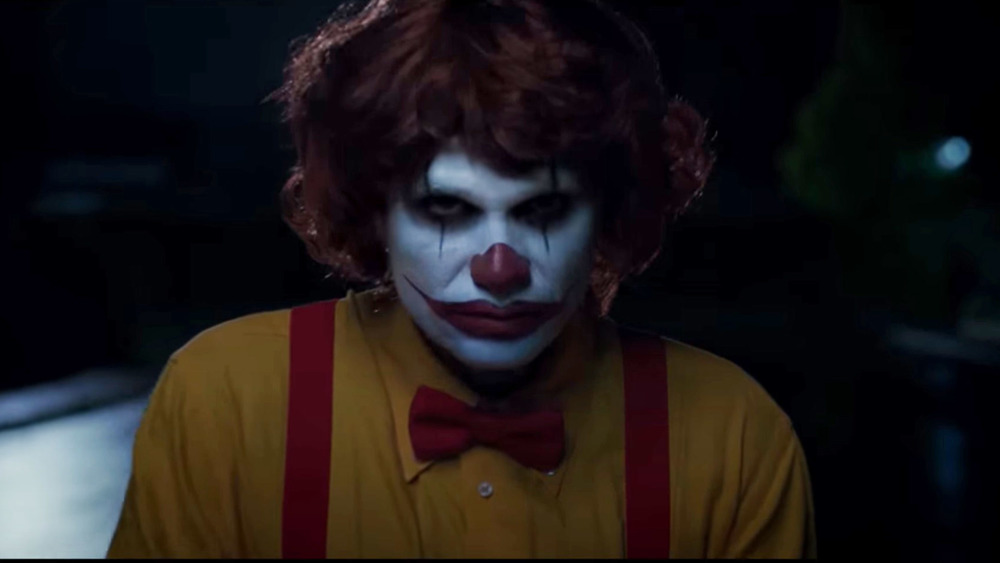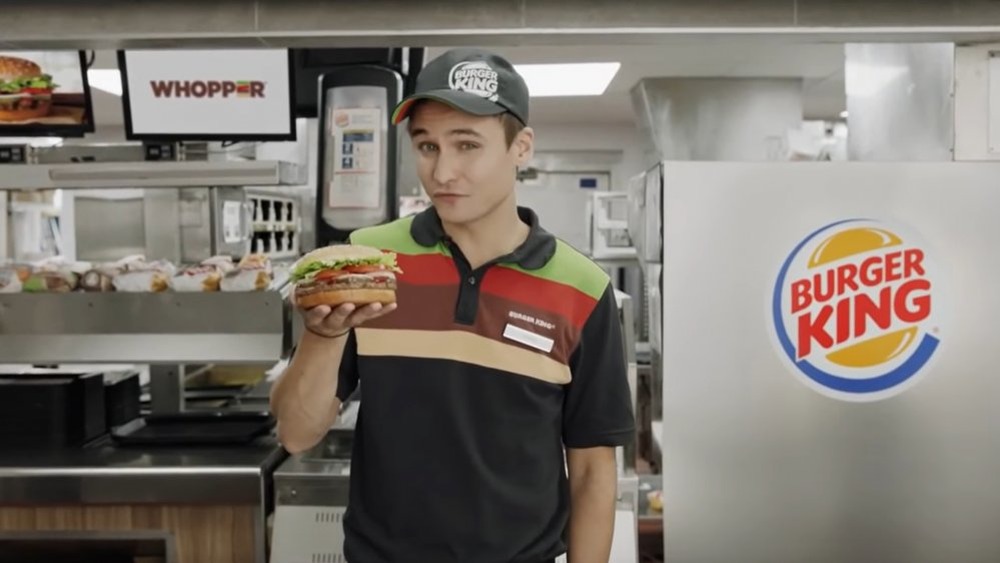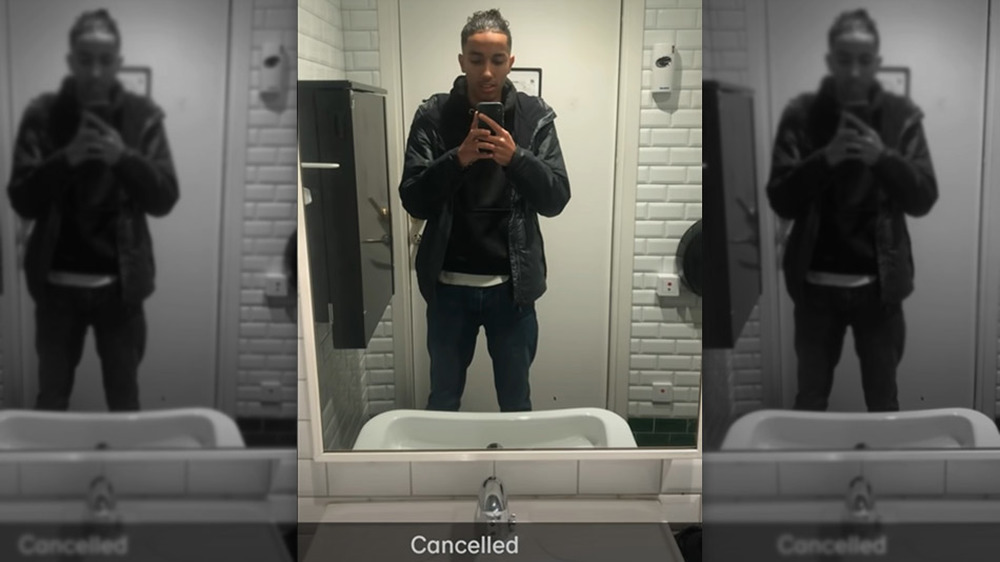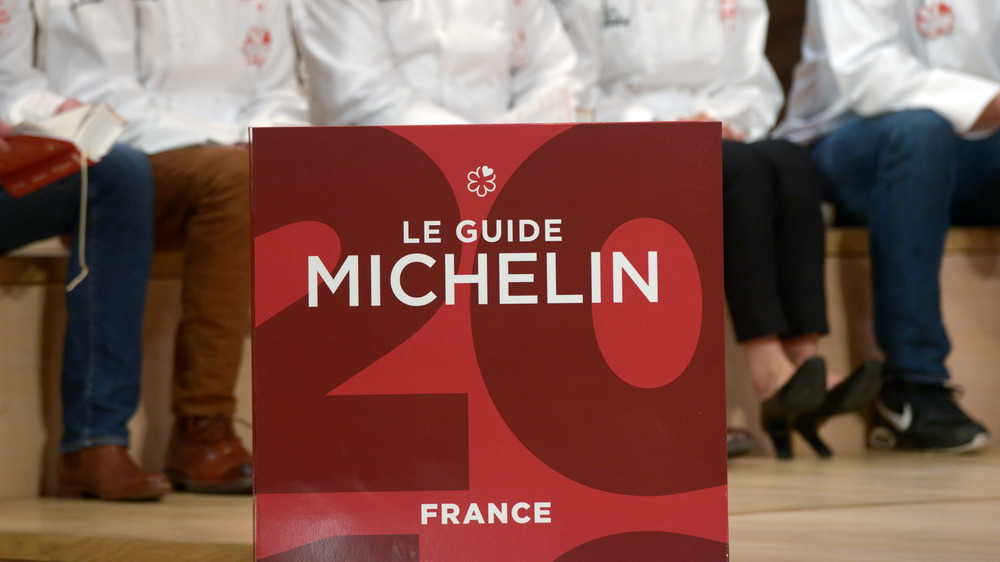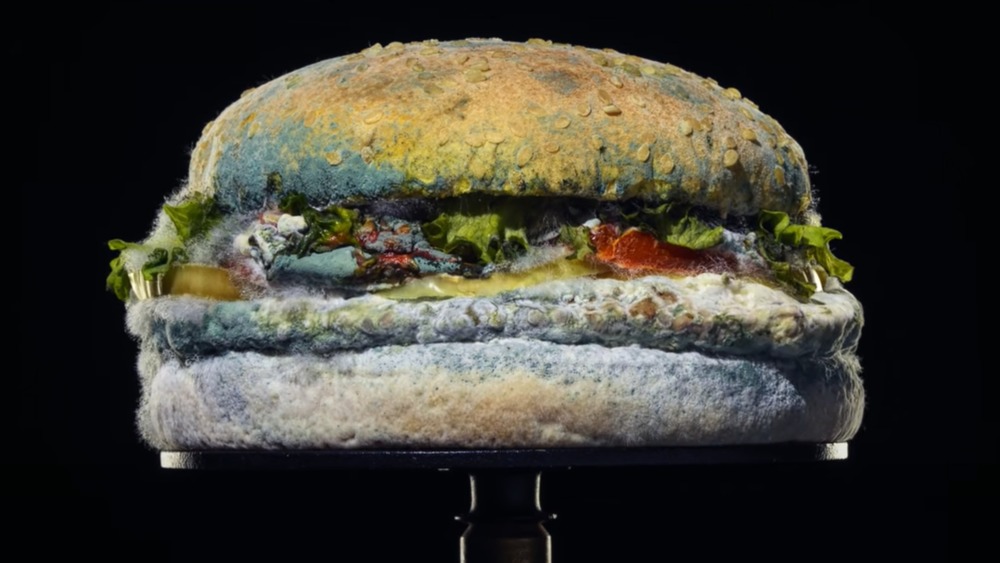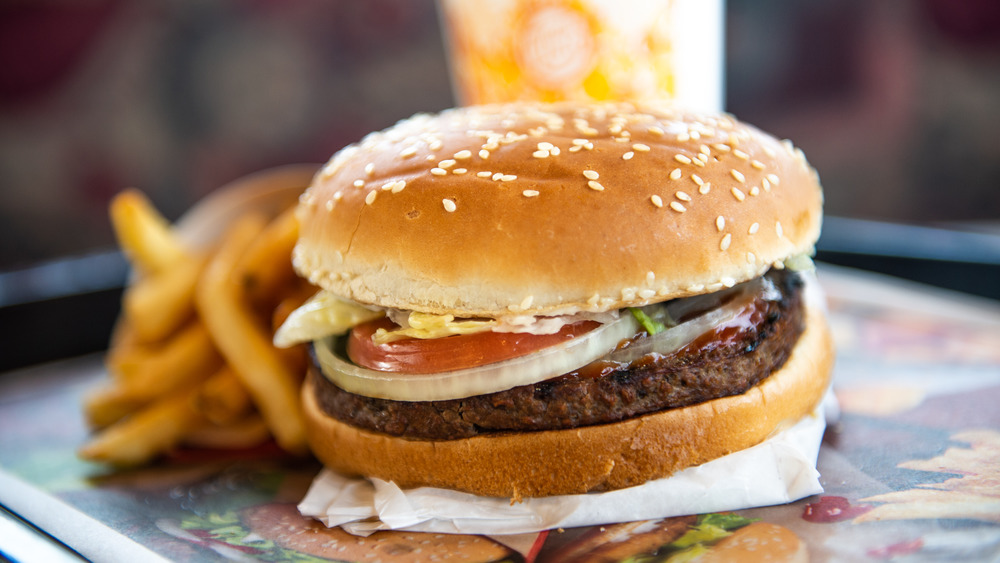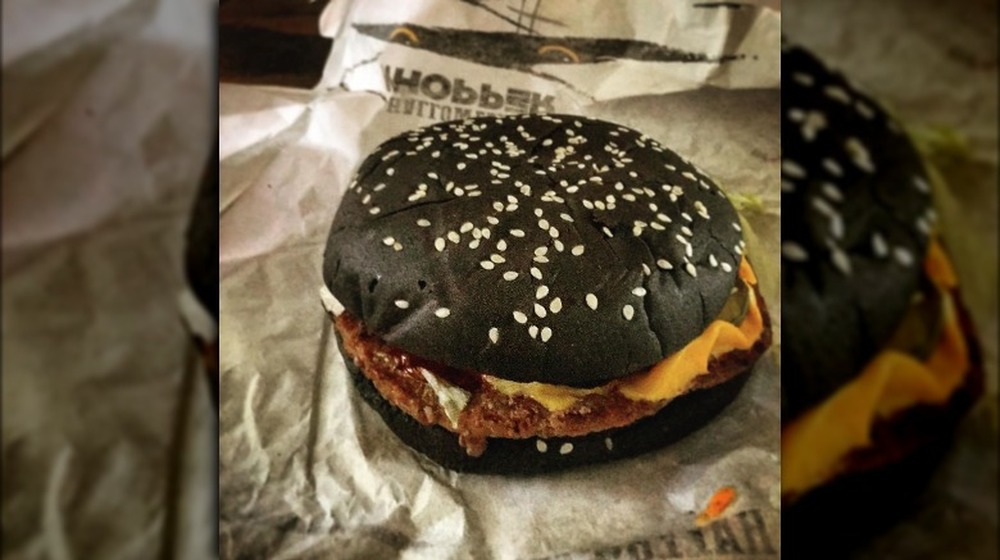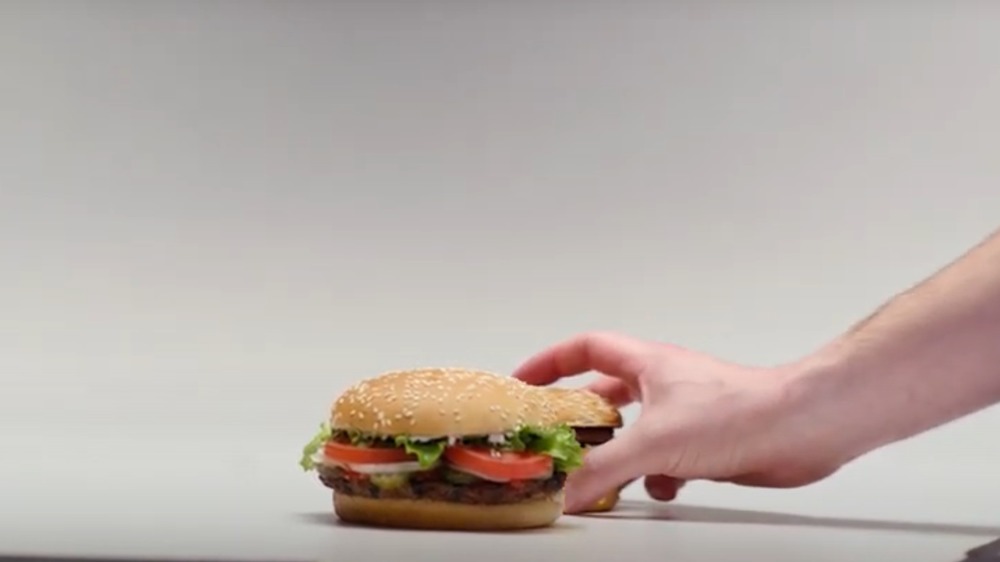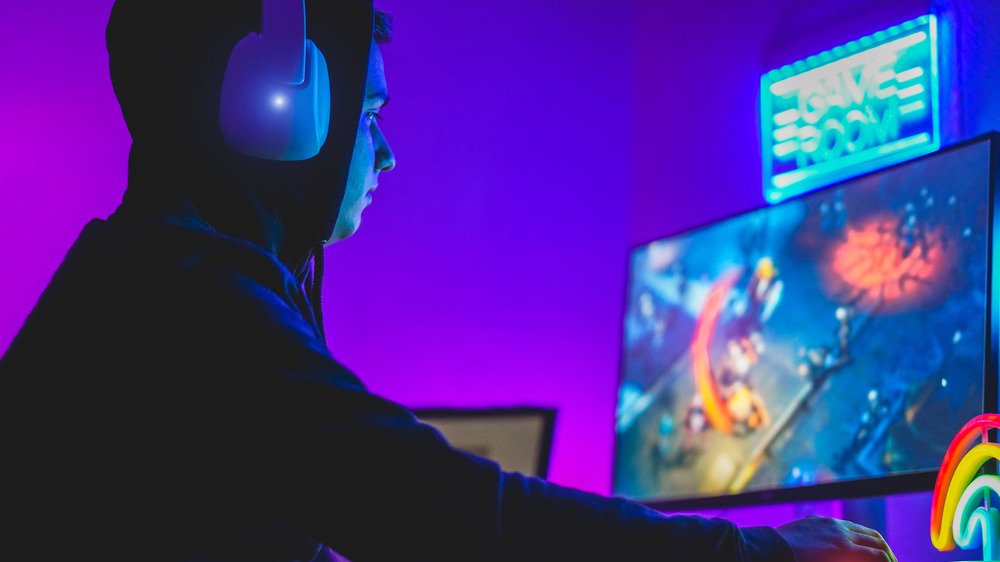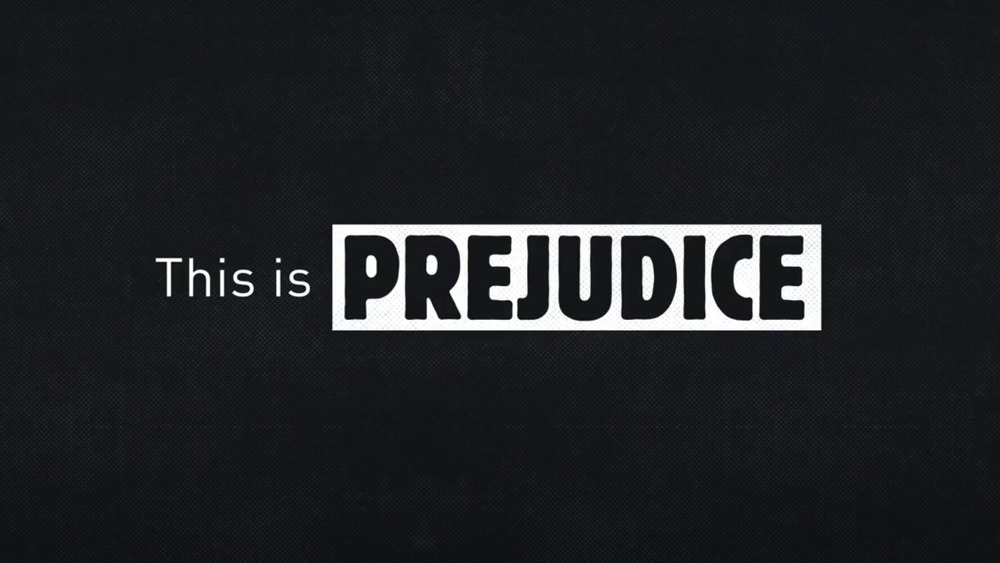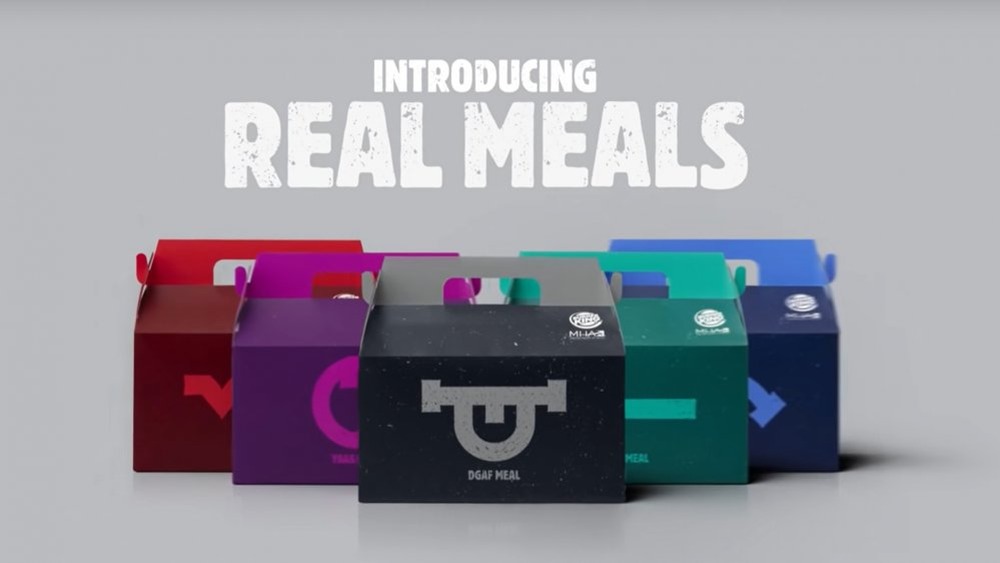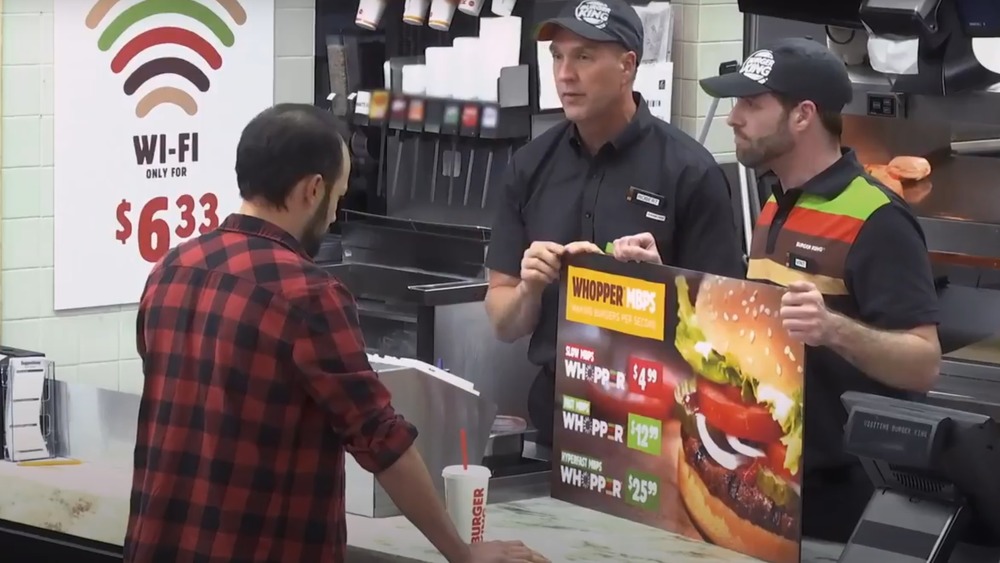The 6 Best And 6 Worst Marketing Stunts In Burger King's History
For over half a century, Burger King has sat at the top of the burger joint food chain — or near enough to the top, at least. Of course, you've gotta get the word out if you want to sell billions of burgers a year, and boy, does Burger King get the word out.
Over the years, this fast food company has produced some of the wildest, silliest, most audacious marketing campaigns ever known in the industry. Sometimes they're genius, other times they're total flops, and occasionally they're both. They can go exceptionally well ... or incredibly badly. Many raise surprisingly important and hard-hitting issues. Some are utterly misguided. Often, they win the praise of the media and the public — and even earn Burger King a few awards. Then again, they often do nothing more than tick people off. One thing that's always true of Burger King's campaigns, at least, is that you can never tell what they're going to do next — for better or for worse. These are the six best and six worst marketing stunts in Burger King's history.
Worst: Free Burger King Whoppers for creepy clowns
It's probably fair to say that the jury's out on creepy clowns. While plenty of people love them — there's a reason they made two It movies, you know — some people can find them deeply unsettling or even genuinely terrifying. Still, most of the time they're relegated to movies and TV shows, and even on Halloween, you're never going to see too many in one place. Right?
Wrong. Enter Burger King's 2017 Halloween marketing campaign, during which, at select stores, the chain would offer a free Whopper to anyone dressed as a creepy clown. They repeated the stunt a year later in London, by offering a Whopper to the first 500 clowns at their Leicester Square branch.
Look, we're not buzzkills, yeah? We know how to have fun. We can be cool or hip or what-have-you. But turning your stores into gigantic magnets for terrifying clowns on Halloween just seems harsh on people who can't stand them. Coulrophobes need Whoppers too, you know.
Best: The Burger King Okay Google ad
Described by The Verge as "horrible, genius, infuriating, hilarious, and maybe very poorly thought-out," Burger King's 2017 TV ad was arguably one of the cleverest things the company has ever done.
The ad is simple: a man in a Burger King uniform leans into the camera and says: "Okay Google, what is the Whopper burger." If you owned a Google Home device, this phrase would trigger it into reading out Wikipedia's entry for the Whopper ... whether you wanted it to or not. Burger King even edited the entry in the run-up to the ad's debut, in order to put more focus on the ingredients and make it sound more palatable to consumers.
Honestly, putting out this ad was kind of a jerk move on Burger King's part. They didn't consult Google on the campaign, they broke Wikipedia's rules on "shameless self-promotion," they attempted a workaround when Google finally blocked it, and, most importantly of all, they annoyed a whole bunch of people. But come on — it's stone-cold genius. You can hate them for it all you like, but someone in Burger King's marketing department had their thinking cap on the day they came up with this one. No wonder the company won an award for it.
Worst: Burger King's Canceled Clown stunt
Again? Seriously, Burger King?
Yes, it seems the company decided to send in the clowns once more for Halloween 2020, when Burger King locations in Sweden and Denmark were outfitted with voice-activated software in their restrooms, designed to creep out visitors after they said the words "canceled clown" three times into the mirror. If you were brave enough to do this, the lights would cut out (bad luck, people in the stalls) and a straight-up terrifying clown would appear in the mirror.
"A few years ago, a particular clown got abruptly 'canceled' from his long-standing job at a certain hamburger chain," Burger King said in their announcement video. "But this Halloween, he is back — at Burger King restrooms."
And okay, you've got to give them credit for at least implementing some form of consent into this particular stunt, but that's off-set a little when you realize that this was the third year in four that they had gone back to the clown well. We get that it's a dig against McDonald's and Ronald McDonald, but come on — throw us a vampire or two, will ya?
Best: Burger King's campaign for a Michelin star
In 2020, Kevin Derycke, the CEO of Burger King Belgium launched a petition on Change.org (via In the Know), entitled "Pour que Burger King entre au Guide Michelin." Translated: "For Burger King to enter the Michelin Guide."
It seems that, with the release of Burger King's Belgium's rollout of the Master Angus burger, the company decided it was finally worthy of a Michelin star. In his open letter to Michelin, Derycke wrote: "Close your eyes, but keep them open a little longer to read what follows: first, you will be enchanted by the hypnotic perfume of a perfect flame grilled Angus patty wrapped in a soft bun. Then a bouquet of dazzling flavors tickles your taste buds: melted cheddar, mayonnaise with mustard à l'ancienne and onions, crispy bacon, juicy tomatoes, crunchy arugula and a tsunami of... Sorry, we're getting carried away a little."
There's something incredibly gratifying and deeply amusing about seeing a fast food burger chain earnestly try to convince the world it deserves the highest accolade in the restaurant industry. There's something even more amusing about the fact they only got 825 signatures in the process. And there's something genuinely shocking about the fact that Michelin actually agreed to an inspection. Top marks for pulling this one off, BK.
Worst: The moldy Burger King Whopper
Hungry? Not anymore!
In early 2020, Burger King decided that the best way to sell its Whoppers would be to put out a bunch of commercials showing them going moldy. It was supposed to tie in with the announcement that the chain would be removing all the artificial colors, flavors, and preservatives from the Whopper in U.S. stores. It's got no nasty additives, you see, so it goes moldy, just like normal food. Gosh, how impressive. How wonderful. How utterly appetizing.
Based on Burger King's social media pages, the reaction to the moldy Whopper was mixed, receiving almost exactly as many negative comments as positive — although they tend to average at about 75 percent positive. A number of marketing experts CNBC spoke to, however, were all for the ad. "I love it," said Huib van Bockel, a former Unilever marketing executive. "It's about time. It's so important to be open and honest. Of course, food perishes [and] what is controversial about that?"
Well, it's disgusting, Huib. That's what's controversial about it.
Best: The Burger King Whopper Sacrifice
Burger King's Google ad may have been brilliantly devious; the free Whoppers for clowns campaign might have been a little cruel — but the Whopper Sacrifice was nothing less than pure evil ... in the best possible way.
In 2009, Burger King created a Facebook app that offered a coupon for a free hamburger, on one condition: you had to delete ten Facebook friends. "Now is the time to put your fair-weather Web friendships to the test," the Whopper Sacrifice site said. "Install Whopper Sacrifice on your Facebook profile, and we'll reward you with a free flame-broiled Whopper when you sacrifice ten of your friends."
And if that weren't enough, the app's activity would show up in your news feed, essentially broadcasting to everybody you know that your friendship with the people you had removed was worth exactly as much as 1/10th of a Whopper from Burger King. In a matter of days, 60,000 people had installed the app, 20,000 coupons were distributed and 200,000 Facebook friends were deleted. After just over a week, Facebook disabled the campaign, claiming it was a violation of user privacy, but this just thrust the campaign even further into the spotlight.
There's a lot to be said here about what the Whopper Sacrifice said about the fragility of friendship in the digital age, about consumerism and interconnectivity, and about the very purpose of Facebook itself. Most importantly, though, it was really funny. And sometimes that's all that really matters.
Worst: The Burger King Halloween Whopper
At this point, you've got to wonder if Burger King ought to just sit Halloween out. This misfire occurred in 2015, when the chain introduced the now-notorious Halloween Whopper; essentially a normal version of the Whopper but with a black bun. That, however, is not what the Halloween Whopper is remembered for today. No, ask anyone who remembers it and they'll tell you the same thing every time: it's the burger that turned your poop green.
Apparently, this was something to do with the food coloring Burger King used in their Halloween Whoppers. The chain had added blue, red, yellow, and "caramel" coloring to the burger, turning the bun black. But after your gut absorbs most of it in the gut, a little blue remains, which mixes with the yellow-green bile in your intestine. The result? Green stool.
Dr. Ian Lustbader, a professor of medicine and gastroenterologist, told LiveScience that "sometimes stool color is very important, and sometimes we can get worried inappropriately about the color of stool." He also stressed that, while there's nothing unhealthy or dangerous about this, "Things like food coloring, done for cosmetic reasons and not the nutritional value of the product, do we really need that?"
Of course, they say there's no such thing as bad publicity — but they probably invented that saying before someone tried to sell a burger that gave people green poop.
Best: A Big Mac behind every Burger King Whopper
2019's Burger King ad campaigns seemed pretty by-the-numbers — for Burger King, at least. They rolled out a number of posters, digital commercials, and billboards, all of which featured a simple image of a Whopper. There wasn't much else to it, really. Or was there?
Well, in the final days of 2019, Burger King confessed something to the world: that there had been a Big Mac in every single one of the photographs used on these ad campaigns. But where was it? Why, behind the Whopper, of course. Burger King made the big reveal in a new, separate commercial that showed behind-the-scenes footage of the photoshoot, proving that each Whopper had been placed in front of a Big Mac before the shoot. The message was simple: Whoppers are bigger than Big Macs. And what a way to say it.
Speaking about the stunt, the chief creative officer at the creative agency BBH Ian Heartfield said: "Placing our competitor's product in our own ads throughout 2019 without anyone knowing has been one of the most fun ideas we have ever executed. It is of course just a good old fashioned product comparison idea, but it's been brought bang up to date by some lateral thinking and rebellious media behaviour. We're loving it."
Worst: Burger King's Twitch donation scandal
Plenty of brands have tried to hop on the streaming bandwagon in the last few years, but none have messed up so spectacularly as Burger King did in August 2020.
The streaming platform Twitch has a bot that is used by viewers and fans to send messages to streamers. It's a neat concept, and essentially means that, for a small donation, anyone watching can ask their favorite streamers questions or make comments about what they're watching. Burger King, however, sniffed an opportunity. The company signed up a number of accounts on Twitch, then began donating small amounts of money to major streamers. Only, instead of asking questions or passing comments, they would make the bot read out Burger King deals.
In a video released shortly after, Burger King insisted that it had turned "donations into ads" by making "streamers and viewers hungry." The company was immediately bombarded with criticism, however. "We generally follow protocol when it comes to doing advertisements," streamer Ross O'Donovan told BBC Radio 1. "You have to disclose that it's an ad to your viewers. It costs a lot more than $5 for a company to partner with a streamer, so it's just very scummy to circumvent that whole thing and do it through a donation."
Hard not to agree with that one.
Best: Prejudice vs opinion
Anyone who's been anywhere near the internet in the last two decades will be able to tell you that there's a very fine line between opinionated criticism and hate speech — a line that can often become blurred, or even invisible.
In 2018, Burger King Brazil decided to highlight this issue by rolling out a commercial that compared valid criticism against Burger King with prejudiced comments found on social media. In the former category were such opinions as "I really hate Burger King. The smell makes me sick," and "Burger King is s***. I really think it's a low quality restaurant." The video then shows a number of comments featuring racial, gender-based, and anti-LGBTQ+ comments, to show how an opinion can often be used as a platform for prejudice and intolerance.
Rafael Donato, creative vice president at the marketing group that created the commercial, said: "Today, some of the worst kind of prejudice is disguised as 'opinion'. So, we compared negative opinions of the brand to real prejudiced comments scattered on social media. Burger King is not afraid to show what haters think about them – if it means championing tolerance and diversity."
This might not seem like the kind of issue that you'd typically find in a burger chain's wheelhouse, but that shouldn't matter. Any attempt to shine a light on this kind of thing ought to be applauded, and you have to give Burger King props for trying to combat the darker nature of the net.
Worst: Burger King's Real Meals
The Happy Meal is one of the most iconic fast food items of all time. So it stands to reason that Burger King would launch their own alternative — but nobody guessed it would have been as misguided as the Real Meal.
For Mental Health Awareness Month 2019, Burger King announced it would be launching a series of mood-based meals that, in BK's only words, are meant to demonstrate how "No one is happy all the time. And that's OK." A deliberate pastiche of the Happy Meal, right down to the box, this line of menu items included the Pissed Meal, the Blue Meal, the Salty Meal, the DGAF Meal and, arguably most cringeworthy of all, the YAAAS Meal.
Inevitably, Burger King came in for a heap of criticism, with social media users accusing the company of trivializing the serious and complex nature of mental illness.
One Twitter user wrote: "wow thank you for raising awareness about "yasss," it claims too many lives every year." Another joked: "Just punched a hole in my wall thinking about all the money I could have saved last year by just having Burger King instead of having to go to the psychiatric hospital."
But one user summed it all up best, when they said: "you're a hamburger restaurant"
Best: Burger King's fighting for net neutrality
Net neutrality has been a hot topic in recent years, thanks in part to attempts made by the FCC under the Trump administration to kill it off, once and for all. In case you're not aware, net neutrality prevents internet providers from interfering with internet traffic, including by blocking and throttling connections for their own ends. This could mean ISPs charging extra money for "fast lane" internet speeds, or offering higher speeds for content they have a stake in. Basically, it's not great news.
In 2018, Burger King launched an ad campaign to raise awareness about the damage that could be caused by the end of net neutrality. The commercial featured actors playing Burger King employees, who make customers wait for longer amounts of time to receive their food — unless they paid extra to get it faster. They would also offer shorter wait times for foods they claimed Burger King was more interested in selling. Essentially, it was a physical demonstration of how an internet without net neutrality might look.
The commercial was praised for exploring the net neutrality issue in a nuanced and realistic manner, and, like Burger King Brazil's ad campaign against prejudice, you have to give credit where it's due for taking a stand on a genuinely vital issue.
